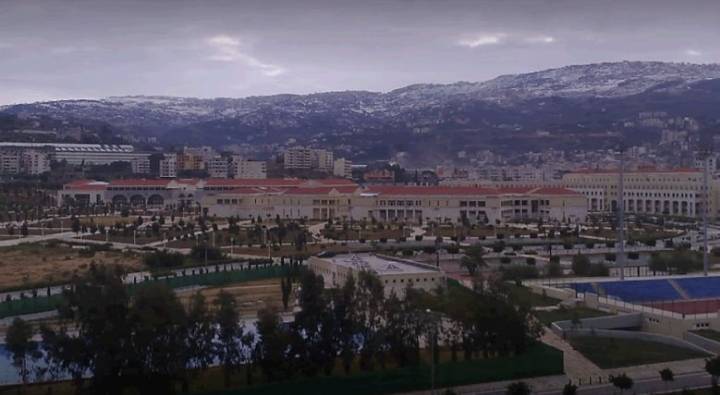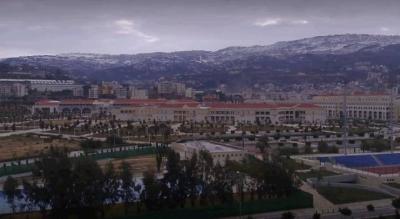The first academic semester is nearing its end in most faculties of the Lebanese University, accompanied by a rapid deterioration of the financial and economic situation. In light of this, voices from some students and professors are rising to demand a return to remote education, considering it a less costly option that alleviates the burdens of exhausting transportation, especially with the closure of student housing and the lack of maintenance within the faculties.
There is no accurate statistic on the percentage of students attending university courses, but those standing at the entrances of the Lebanese University complexes cannot help but notice the marked decline in the flow of students coming and going. Many students are refraining from attending simply because they cannot reach the university, with professors estimating that the attendance rate may not exceed 30% or might reach 50% at best, varying from one faculty to another depending on its nature and whether the teaching system enforces mandatory attendance.
Students discuss a blow to the principle of educational equity, stemming from their inability to bear the transportation costs ranging from one million to three million Lebanese pounds weekly, depending on the distance from their housing to the faculty, while some professors respond with a push for "online" education. An instructor at the Faculty of Arts and Humanities, Anwar Al-Moussa, stated that "remote education is effective in most theoretical faculties." He argued that the intensive formula is neither scientific nor effective, as subjects needing four hours weekly are now being delivered in two hours or one hour, meaning that about 90% of the curriculum is lost for the sake of in-person education, while the time in remote education allows the material to be fully addressed.
The goal of in-person education does not exceed "begging from donors and citing competition with private universities," according to him. He believes that "the purpose of in-person education has disappeared as students could not attend, leading to cases where a professor shows up with no students present."
College directors do not hide the apologies they receive from contracted professors, particularly about continuing in-person education or their complaints about an unbearable situation. This is especially pressing, considering that the process of converting reconciliation contracts into regular contracts according to a recent Cabinet decision will take time to implement. For instance, a director finds it hard to respond to a professor commuting from Jounieh to the Hadath campus for two hours of teaching, receiving compensation that does not exceed 300,000 Lebanese pounds while having spent 1.5 million pounds on fuel.
However, most directors remain committed to the "better and more productive" in-person education system, they say, in addition to the fact that any alteration to the current educational scenario needs careful monitoring of the overall university situation. "The Lebanese University cannot make such a decision alone, separate from other Lebanese universities, especially since we are not in a general mobilization situation as was the case during COVID," according to Rami Najm, director of the first branch of the Faculty of Media.
"The remote education is a total disaster," stated Yasser Mahna, director of the Faculty of Science. He pointed out that "there is not a significant difference in student attendance percentages compared to previous years; our faculty remains open without enforcing mandatory attendance, enabling students who can attend to record lectures for their classmates."
At the Faculty of Arts and Humanities—First Branch, the number of students participating in lectures has dropped to 10%, according to branch director Souha Hammoud, except for the psychology department, which has maintained student attendance. She stated that "students are unable to pay for transportation, and registration was extended primarily due to an inability to cover tuition fees. Some were provided with lecture materials in PDF format as they can’t afford to have them printed."
So far, there is no new scenario replacing the recommendation for in-person education in any other form, but some professors believe there is no sound management of the ongoing crisis. According to a professor at the Faculty of Science, Alaa Ghaith, "things are left to informal measures, and there is no comprehensive plan to address the reality. Additionally, we haven’t seen such a plan at a minimum." He believes that pulling the university from its slow death requires urgent intervention from the state and political parties.
He indicated that "solutions should focus on addressing the most pressing issue—providing transportation for students and reopening student housing," emphasizing that "private universities are facing the same problem but managed to find different solutions for their students, distancing themselves from the online education option, which most professors find detrimental to education."
Tereza Seif, a professor at the Institute of Social Sciences—Second Branch, noted that there has been no decline in attendance in her classes since the beginning of the first semester, stating that "students were pleased to return for better quality education, and steps should be taken to manage the crisis, just as we did when we intensified study days, rather than considering a shift to remote education, where technical issues arise along with compounded Internet and electricity problems."
The Dean of the Faculty of Engineering, Rafiq Younes, has a special view regarding handling the current crisis. He believes that the university management must "respond to a blended education approach, which requires supplying professors with necessary support while ensuring the operations of faculties and campuses to guarantee the presence of professors first. Attendance by students depends on their abilities: those who can reach campus continue attending in person, while those who cannot could have lectures recorded and sent to them or follow them online. The situation does not allow us to bear the burden of in-person education merely because international aid is linked to it, and hoping for it is futile since universities are not on the list of international financial aid but only in-kind support; the university sector worldwide is left to face its problems independently."
Younes dismissed the idea that the number of university students has declined, stating, "the issue is in the delay of tuition payments, so there is no fear for student enrollment. What matters is that we secure the maintenance of facilities, support professors, and adopt blended learning, which provides learning materials to both present and absent students."
Badran: Legal Hurdle to Remote Education
University President Bassam Badran insists on maintaining in-person education due to two main hurdles. The first is legal, "as there is currently no law in the Parliament covering the issuance of degrees for remote education, as was the case during COVID, while the university cannot make a unilateral decision aside from other universities. The second hurdle is the lack of quality in remote education; the students themselves who complain about transportation costs lack the basic requirements for education at home, such as a computer and fast internet. Previous experiences indicate that a class would not attract more than 18 students at best, and all professors can confirm this."
Regarding proposed solutions for transportation issues, the university administration, according to Badran, has put forward a plan to use buses covering various routes from peripheral areas to the university’s faculties in Beirut for nine months, costing around 2.25 million dollars. However, the university has not received any response from donor entities or the state regarding this issue. Sources in the Ministry of Public Works and Transport clarified that the problem lies in the cessation of bus operations that Minister Ali Hammieh attempted to provide after drivers approved by the railway authority resisted continuing work at a salary not exceeding 2.4 million Lebanese pounds. They noted that one of the four confirmed routes was toward Hadath campus, and students, like other citizens, would have benefited from the nominal fare of 20,000 pounds.
The Bet on the New Association
This week will see the determination of the date for the election of the executive authority of the association of full-time professors at the Lebanese University (2022-2024), following the completion of the first two phases, which involved the election of delegates who won by a wide margin through acclamation. Professor Ali Rahhal from the Faculty of Law won the presidency of the council of delegates, while Tereza Seif from the Institute of Social Sciences was uncontested as the council’s secretary. Despite this, a group of active professors at the university still hopes to revive union work, which has been dormant in recent years, preparing for the final stage based on the belief that no work can be effective in any institution without a union representing the professors’ voice. Sources from the group indicate that the association has lost its role and the professors’ trust since it relinquished its negotiating tasks concerning their rights to the university president.




